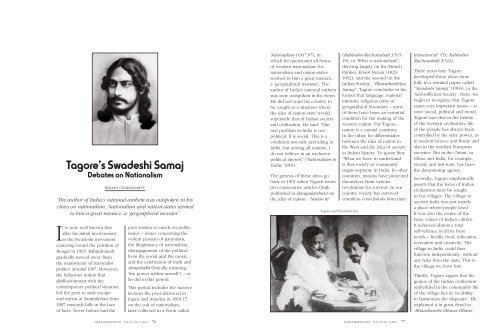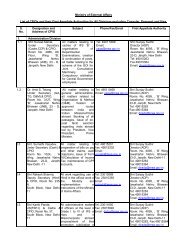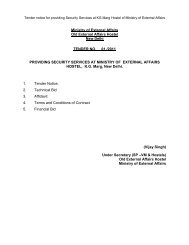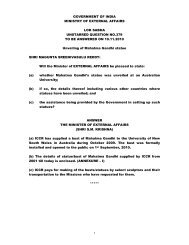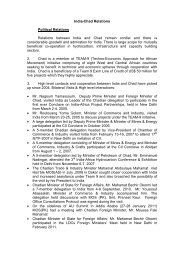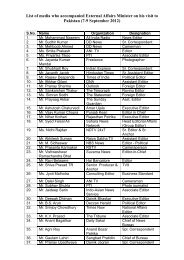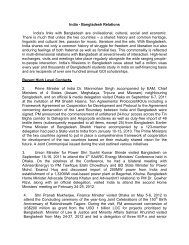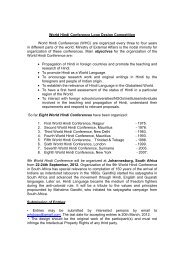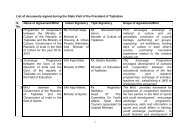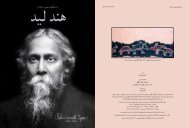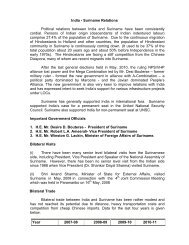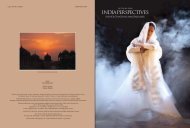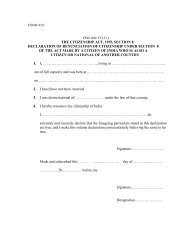<strong>Tagore</strong>’s Swadeshi SamajDebates on NationalismBIKASH CHAKRAVARTYThe author <strong>of</strong> India’s national anthem was outspoken in hisviews on nationalism. Nationalism and nation-states seemedto him a great menace, a ‘geographical monster’.It is now well known thatafter his initial involvementin the Swadeshi movementcentering round the partition <strong>of</strong>Bengal in 1905, Rabindranathgradually moved away fromthe mainstream <strong>of</strong> nationalistpolitics around 1907. However,the fallacious notion thatdisillusionment with thecontemporary political situationled the poet to seek escapeand retreat at Santiniketan from1907 onwards falls in the face<strong>of</strong> facts. Never before had thepoet written so much on publicissues – issues concerning theviolent passion <strong>of</strong> patriotism,the illegitimacy <strong>of</strong> nationalism,disengagement <strong>of</strong> the politicalfrom the social and the moral,and the celebration <strong>of</strong> truth andatmashakti (literally meaning,‘the power within oneself’) – ashe did in this period.This period includes the incisivelectures the poet delivered inJapan and America in 1916-17on the cult <strong>of</strong> nationalism,later collected in a book calledNationalism (1917:97), inwhich he questioned all forms<strong>of</strong> western nationalism; fornationalism and nation-statesseemed to him a great menace,a ‘geographical monster’. Theauthor <strong>of</strong> India’s national anthemwas now outspoken in his views.He did not want his country tobe caught in a situation wherethe idea <strong>of</strong> nation-state wouldsupersede that <strong>of</strong> Indian societyand civilization. He said: “Ourreal problem in India is notpolitical. It is social. This is acondition not only prevailing inIndia, but among all nations. Ido not believe in an exclusivepolitical interest” (Nationalism inIndia, 1916).The genesis <strong>of</strong> these ideas goback to 1901 when <strong>Tagore</strong> wrotetwo consecutive articles (bothpublished in Bangadarshan) onthe idea <strong>of</strong> nation: “Nation ki”<strong>Tagore</strong> and Priyanath Sen(Rabindra-Rachanabali 3:515-19), or ‘What is nationalism?’,drawing largely on the Frenchthinker, Ernest Renan (1823-1892), and the second on theIndian Society, “BharatbarshiyaSamaj”. <strong>Tagore</strong> concludes in theformer that language, materialinterests, religious unity orgeographical boundary – none<strong>of</strong> these have been an essentialcondition for the making <strong>of</strong> thewestern nation. For <strong>Tagore</strong>,nation is a mental construct.In the other, he differentiatesbetween the idea <strong>of</strong> nation inthe West and the idea <strong>of</strong> societyin Indian history. To quote him:“What we have to understandis that society or communityreigns supreme in India. In othercountries, nations have protectedthemselves from variousrevolutions for survival. In ourcountry society has survivedcountless convulsions from timeimmemorial” (Tr; Rabindra-Rachanabali 3:522)Three years later <strong>Tagore</strong>developed these ideas morefully in a seminal paper called“Swadeshi Samaj” (1904), or the‘Self-sufficient Society’. Here, webegin to recognize that <strong>Tagore</strong>raises very important issues – atonce social, political and moral.<strong>Tagore</strong> says that in the history<strong>of</strong> the western civilization, life<strong>of</strong> the people has always beencontrolled by the state power, asin ancient Greece and Rome andalso in the modern Europeansocieties. But in the Orient, inChina and India, for example,society and not state, has beenthe determining agency.Secondly, <strong>Tagore</strong> emphaticallyasserts that the locus <strong>of</strong> Indiancivilization must be soughtin her villages. The village inancient India was not merelya place where people lived.It was also the centre <strong>of</strong> thebasic values <strong>of</strong> Indian culture.It achieved almost a totalself-reliance in all its basicneeds – health, food, education,recreation and creativity. Thevillage in India could thusfunction independently, withoutany help from the state. This isthe village we have lost.Thirdly, <strong>Tagore</strong> argues that thegenius <strong>of</strong> the Indian civilizationembedded in the community life<strong>of</strong> the village lies in ‘its abilityto harmonize the disparate’. Heexplained it in great detail in‘Bharatbarshe ltihaser Dhara’,INDIA PERSPECTIVES VOL 24 NO. 2/2010 76 INDIA PERSPECTIVES VOL 24 NO. 2/2010 77
or ‘The Course <strong>of</strong> History inIndia’ (Prabasi, 1319 B.S.,Baishakh: 423-451), and in otheressays, where he insisted thatIndian history, had achievedan ideal synthesis <strong>of</strong> diverseelements at all levels <strong>of</strong> humanexperience (‘it is a perpetualprocess <strong>of</strong> reconciliation <strong>of</strong>contradictions’, he said). Thus,his idea <strong>of</strong> nation-buildingmust be understood in terms <strong>of</strong>inclusion, and not in terms <strong>of</strong>exclusion.Implicit in these issues is <strong>Tagore</strong>’sfirm belief that the village is thecentre <strong>of</strong> Indian culture – whichwe have lost in the course<strong>of</strong> time, and which needs tobe retrieved and resurrected.And that alone could bringus independence. Followingthe idea <strong>of</strong> Mahatma Gandhi(1869-1948), he says this shouldbe done through an absolutecommitment to the cultivation<strong>of</strong> love and neighbourliness,restraint and sacrifice, self-helpand hard labour – that isthrough the full organization<strong>of</strong> atmashakti. However, eventhough <strong>Tagore</strong> does not endorsethe role <strong>of</strong> modern technologyin reconstructing the village,he does accept the logic <strong>of</strong>liberal-democratic organizationas is evident from a detailedconstitution he drafted for‘Swadeshi Samaj’ and fromhis appeal to the people toelect a leader for the proposedorganization.It is worth noting at thispoint that <strong>Tagore</strong>’s “SwadeshiSamaj” (1904), in some <strong>of</strong> itsbasic postulates, anticipatesGandhi’s ‘Swaraj’ conceivedin Hind Swaraj written in1909. In his emphasis on thevalues <strong>of</strong> poverty, suffering,restraint and sacrifice and hisidealization <strong>of</strong> the rural life,<strong>Tagore</strong> at this period comesquite close to Mahatma’s idea<strong>of</strong> nation-building. For both<strong>of</strong> them, ‘Swaraj’ in the finalanalysis ceases to be a politicalprogramme. It was an alternativeway <strong>of</strong> living. But we shouldalso note a difference. <strong>Tagore</strong>did not believe in ‘enlightenedanarchy’ as Gandhi did (ThePenguin Gandhi Reader,New Delhi, 1993:79). That iswhy <strong>Tagore</strong> does not rejectthe concept <strong>of</strong> that state in“Swadeshi Samaj”; he onlyrefuses to recognize it as thedetermining agency in the life <strong>of</strong>community. To put it differently,for <strong>Tagore</strong>, the state and thecommunity are not competingcategories; they are, in the best<strong>of</strong> times, complementary.The divergence betweenthe views <strong>of</strong> the Poet andthe Mahatma widens in thedecades after the First WorldWar. <strong>Tagore</strong>’s first clear note<strong>of</strong> dissent from Gandhi’sconcept <strong>of</strong> ‘Swaraj’ was struckin a long rejoinder from thePoet to the Mahatma. At onestage, <strong>Tagore</strong> says: “Building<strong>of</strong> Swaraj involves an elaboratetheoretical frame work, itsprocess is intricate and lengthy.It needs emotion and aspirationbut it also needs empiricalresearch and rational thinkingin equal measure. In buildingthe nation, we require theeconomists to apply their minds,engineers to use their skill andthe educationists and politicalscientists to play their respectiveroles” (Translated). The argumentis frankly statist, its logic issuingstraight from the epistemology<strong>of</strong> the European Enlightenmentbecause <strong>Tagore</strong> never deniedthe importance <strong>of</strong> the state, nordid he discard the legacy <strong>of</strong>the European Enlightenment.During the Gitanjali phase (1904onwards), <strong>Tagore</strong> seems to havecome quite close to erasingthe gap between the naturalorder and the moral order – apostulate Gandhi believed in allhis life. However, in the 20s andthe 30s, <strong>Tagore</strong> seems to haverevised his earlier Spinozisticposition in favour <strong>of</strong> Kantiancritique <strong>of</strong> practical reason,separate the moral order fromthe natural order.<strong>Tagore</strong> with Rashbehari Bose in Japan, 1929What, finally, then is <strong>Tagore</strong>’sidea <strong>of</strong> Swaraj? In the postwardecades, the poet wasincreasingly moving towards aconcept <strong>of</strong> internationalism asthe basis <strong>of</strong> a true nation. Hesaid in a letter to C.F. Andrews(1871-1940) in May, 1921: “I feelthat the true India is an ideaand not a mere geographicalfact… the idea <strong>of</strong> India is againstthe intense consciousness <strong>of</strong>the separateness <strong>of</strong> ones’s ownpeople from others, and whichinevitably leads to ceaselessconflicts. Therefore my oneprayer is: let India stand forthe co-operation <strong>of</strong> all peoples<strong>of</strong> the world. The spirit <strong>of</strong>rejection finds its support in theconsciousness <strong>of</strong> separateness,the spirit <strong>of</strong> acceptance in theconsciousness <strong>of</strong> unity”.I submit that <strong>Tagore</strong>’s idea<strong>of</strong> Swaraj finally rests in avision <strong>of</strong> a liberal-democraticrepresentationalorganizationhaving a minimal contact withthe state power – which willnot resist the tenets <strong>of</strong> scientificrationality and the use <strong>of</strong>admissible technology. Thisorganization, however, mustdevote itself to the strenuoustask <strong>of</strong> reconstructing the villageas the centre <strong>of</strong> Indian culture.As he has been repeatedlysaying, we must win our Swaraj‘not from some foreigner, butfrom our own inertia, ourown indifference’. This Swaraj(or ‘self-governance’) – call itSwadeshi Samaj (‘Self-governedsociety’) – will function byinclusion in the sense that itmust be open to the world. Didnot Gandhi talk about moreor less the same kind <strong>of</strong> vision(except <strong>of</strong> course the question<strong>of</strong> the state and the intrusion<strong>of</strong> technology) in a letter toJawaharlal Nehru (1889-1964)in 1945? The letter read: “Youwill not be able to understandme if you think that I am talkingabout the villages <strong>of</strong> today.My ideal village still existsonly in my imagination … Inthis village <strong>of</strong> my dreams thevillager will not be dull – he willbe all awareness … Men andwomen will live in freedom,prepared to face the wholeworld” (Raghaban lyer, ed., TheMoral and Political Writings <strong>of</strong>Mahatma Gandhi, New Delhi,1986: vol. I: 286).◆The author is a renowned <strong>Tagore</strong> scholarhaving edited and published several workson the poet. He has also taught Englishliterature at Visva Bharati.INDIA PERSPECTIVES VOL 24 NO. 2/2010 78 INDIA PERSPECTIVES VOL 24 NO. 2/2010 79


